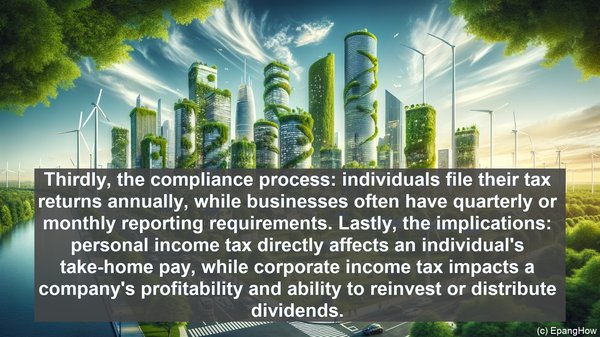Introduction: The Taxation Landscape
Greetings, fellow learners! Taxation is an integral part of any economy, ensuring the smooth functioning of public services and infrastructure. Today, we’ll be exploring two key facets of this realm: personal income tax and corporate income tax. While both involve the payment of taxes, they differ significantly in their application, rates, and implications. Let’s dive in!

Personal Income Tax: Taxation at an Individual Level
Personal income tax, as the name suggests, pertains to the taxation of an individual’s earnings. It encompasses various sources, such as salaries, wages, bonuses, and even income from investments or rental properties. The tax rate for personal income tax is typically progressive, meaning it increases as the income bracket rises. This ensures a fair distribution of the tax burden, with higher earners contributing more. Additionally, personal income tax allows for certain deductions and exemptions, reducing the taxable amount. These deductions can include expenses related to education, healthcare, or even mortgage interest. It’s crucial for individuals to file their tax returns accurately, as non-compliance can result in penalties or legal consequences.
Corporate Income Tax: Taxation in the Business Sphere
On the other hand, corporate income tax focuses on the taxation of businesses. This includes companies, partnerships, and even certain types of organizations. Unlike personal income tax, which considers individual earnings, corporate income tax looks at the profits generated by a business. The tax rate for corporate income tax is usually flat, meaning it remains constant regardless of the profit level. However, there may be variations based on the jurisdiction or the nature of the business. Corporate income tax also allows for deductions, but these are often related to business expenses, such as employee salaries, operational costs, or investments in research and development. It’s worth noting that corporate income tax is a significant factor in business decisions, as it directly impacts the bottom line and profitability.
Key Differences: Personal vs Corporate Income Tax
While personal and corporate income tax share the common goal of revenue generation, several distinctions set them apart. Firstly, the tax rates: personal income tax is typically progressive, while corporate income tax is often flat. This means that individuals with higher incomes pay a higher percentage of their earnings, while businesses pay a consistent rate. Secondly, the deductions: personal income tax allows for a broader range of deductions, including those related to personal expenses, while corporate income tax deductions are primarily business-oriented. Thirdly, the compliance process: individuals file their tax returns annually, while businesses often have quarterly or monthly reporting requirements. Lastly, the implications: personal income tax directly affects an individual’s take-home pay, while corporate income tax impacts a company’s profitability and ability to reinvest or distribute dividends.

